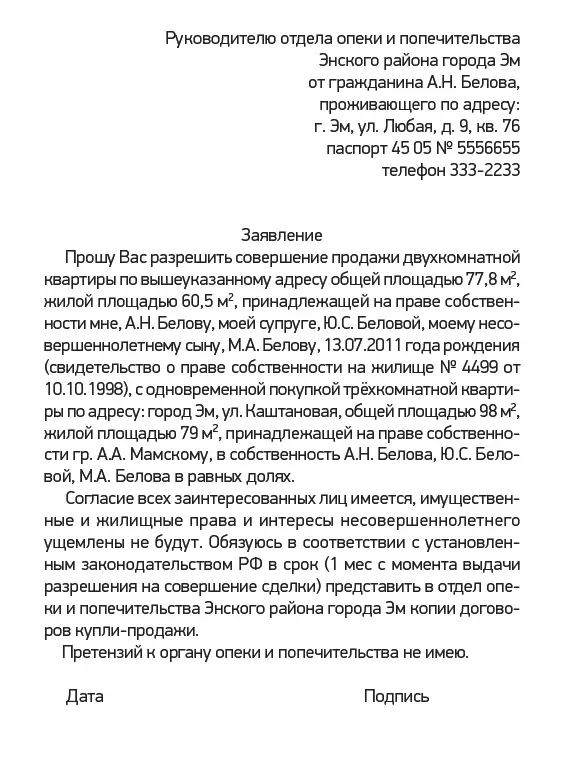Any realtor knows well that some apartments are very difficult to sell. Among the most problematic transactions - the purchase and sale of housing, one of whose owners is a child. Consider what features of operations with such real estate

Any realtor knows well that some apartments are very difficult to sell. Among the most problematic transactions - the purchase and sale of housing, one of whose owners is a child. Consider what features of operations with such real estate

If the child is not the owner of the apartment, but only registered in it, it is not necessary to obtain permission from the guardianship. But if it is established that a minor actually was deprived of parental care either when dealing with his rights, the contract of sale can be challenged for 3 years
Children's rights
The consent of the guardianship and guardianship bodies is necessary in transactions leading to a decrease in the share of real estate, the only owner or the owner of the part of which is a minor. These include:- purchase and sale;
- donation;
- Secondary property;
- Delivery to or rent, free use;
- exchange;
- rejection of the preferential purchase of a share;
- property division;
- refusal of inheritance;
- Isolation of the share of the property of a minor.
According to Russian legislation, the age of 18 comes. Adultantaries uses its rights in full, it is completely independent when concluding any transactions (of course, this does not apply to those people whose legal capacity is limited due to their mental illness (mental disorder).
The "nightmare" realtor is minors, that is, children under the age of 18. Junior minors (under under 14) have the right to manage their own personnel money, make small household transactions. All other legally significant actions perform legal representatives of the child (parents, adoptive parents, guardians - for children under 14). Without a visa of a legitimate representative of the transaction, committed by the child, from a legal point of viewless.
Senior minors (aged 14-18) enjoy much greater freedom: they can independently dispose of personal incomes (for example, scholarships, fee), making bank deposits and use them at its own discretion, as well as to carry out the authorities of the work of science, literature or art , inventions or otherwise protected by the law of its intellectual activity. In addition, minors at the age of 14 and older are entitled to sign in the documents, entering into a deal (however, the written consent of parents or trustees should be obtained for the latter).
There are exceptions: minors can be able to fulfill their rights in full by up to 18 years, if the guardianship authorities (in some cases - the Court) have decided on their emancipation (recognition is fully capable to achieve majority). This may happen if a child at the age of 16 and older works under an employment contract, or with the consent of the parents (trustees) engaged in entrepreneurship, or married. The decision is taken by guardianship authorities. However, there is a substantial condition: both parents (or legal representatives) must agree, otherwise recognize the child emancipated in court.
If the guardianship authorities have adopted a positive decision on emancipation, the minor receives full capacity, that is, the right to independently perform any transactions (and, accordingly, respond to its own obligations). In this case, the permission to conclude a real estate transaction will not be required, and parents will not be able to influence how the child will manage property belonging to him.
To obtain a consent to the commission with housing, the personal presence of the father and the mother in the guardianship department is necessary. Even if the marriage is terminated or one of the parents is registered at another address, both must write a statement
Preparing documents

- the statement of parents to the guardianship and guardianship authorities with a request to accept the transaction (if there are no parents, it is necessary to submit a document confirming this, such as death certificate, the court decision on the deprivation of parental rights or recognizing the parent missingly absent);
- a request to give consent to conclude a transaction of a minor who participates in it aged 14 and older;
- the receipts of all adult owners participating in the transaction, that they agree to participate in the child in real estate operations;
- Certificate (certificate) on the birth of a child (children) or passport (those who have already been 14 years old);
- Documents confirming the ownership of all residential premises participating in the transaction (certificate of ownership of the dwelling, the contract of exchange, purchase and sale, certificate of inheritance by law);
- BTI certificates about the cost of residential premises participating in the transaction (separate certificate for each object);
- Explication and Floor Plan (if you buy a house, - cadastral plan) of all objects;
- genuine statements from house books on all residential premises involved in the transaction;
- statements about the status of financial and personal accounts for all residential premises involved in the transaction;
- certificates from ERC on the absence of debt on utility payments to all residential premises participating in the transaction (the presence of these references is not necessary, but just in case it is better to stock up - to get such documents is not too troublesome).
If a minor is the owner, but registered at another address, it is necessary to provide an extract from the house book at the place of its registration, as well as documents confirming that the transaction performed with the apartment is beneficial for the child. One of the most important documents is a statement of parents, which is transmitted directly to the custody and guardianship authorities. The above is an example of such an application. Consider: apply to guardianship and guardianship authorities only in the presence of a complete set of original books. It is very important not to miss the deadlines: the application (as well as other managerial documents) is valid for 1 month. At the same time, the signatures put in the presence of representatives of guardianship and guardianship bodies. Aishche is one important point: theoretically, the deadline for submission of documents can be extended, but the causes of delay must be respectful. Ktakov does not include the expiration of the deadlines of the action submitted to the consideration of documents or the timing of the deposit of the apartment, as well as any oral or written agreements between the parties.
The list of documents is not subject to expansion, but in some cases the specialists of the guardianship bodies can reduce it. According to realtors, the term of concluding a purchase and sale transaction with an apartment, which has a minor owner or a co-owner, increases about 2 weeks (this time is needed by the guardianship authorities to verify the submitted documents).
The owners of the apartment in which children are registered, must be present at the conclusion of the transaction in the notary - they cannot send a legal representative
Housing arithmetic
By deciding to agree to a real estate deal or refuse, employees of guardianship and guardianship bodies are guided by the rule "It is possible better, it is impossible." This means that the parameters of the new housing of the juvenile should not be worse than the previous one. However, you need to know that two options for the interpretation of this rule are possible: strictly arithmetic (more than meters means better) and high-quality (the assessment is made taking into account all factors in the aggregate: not only area, but also of the location, the availability of basic communications, a separate room for a child, The degree of infrastructure development).Extreme cases, specialists of guardianship bodies use an arithmetic method, based on the fact that as a result of the transaction, the value of the child's property should not decrease. This means that a minor will be in the ownership of another apartment or a stake in the apartment, an equivalent of the one that has been in his selling housing.
When using a qualitative version of the evaluation of the transaction, much more parameters consider than the area of the room, the deposit of the uniform owner. Therefore, if parents want to change the city apartment on a spacious house in the village, they will have to convince the guardianship authorities that the children will be ensured by the same level of comfort that was in the city.
Consider several examples of housing arithmetic.
Two-room apartment change to one-room. Situation is complex: it is clearly not possible to make an equal exchange, even if the number of square meters per child-co-owl will be more in a one-room apartment than in old housing. The decision is: the minor becomes the only owner of the new apartment (in the contract of sale, the child will be listed as the only buyer). Alternative: The child receives compensation in the form of a share in another housing (for example, at the grandfather and grandmother) or in the form of a cash deposit in the amount of the share of a minor in the apartment sold. The contribution to the bank should be opened in the name of the child, but he will be able to use it, only reaching 18 years.
We change the dusty city to the village. From the apartment in which each of the children has no separate room, the family moves to a country house. The nearest school is located in the neighboring settlement. The guardianship and guardianship authorities are likely to make an agreement to make a transaction. The reason is the remoteness of the school or the possible deterioration in the quality of education. However, there is a way out of this situation: evaluate the quality of education will help, for example, statistical data on the number of medalists and graduates of the schools received from universities, as well as the number of teachers - laureates of various premiums in the pedagogical team of the educational institution. If you are planning to teach a child at home, consider: employees of guardianship bodies with great reluctance agree to this, rightly believing that the child must socialize in the team (if home learning is not due to medical prostitutes).
Almost equal exchange . This case is assumed that the minor rights are not violated. However, even with an equal prayer, the apartment may have a completely unlike planning, and with the same total area - various living space and different layout. The only right solution is to take the best room to the child.
Purchase housing in a mortgage loan (apartment on bail). To find a way out of the knowingly non-winning situation, you need to agree on the deposit of the apartment in which the child is registered, with guardianship and guardianship authorities. In addition, when you design a contract, the notary will send a request, whether the deposit has been agreed. In addition, additional information on the contract may be requested, which will allow the specialists of the guardianship authorities to fully assess the situation (whether the loan will be paid, whether the child will remain without a roof over his head) and will speed up the decision.
Buyers and sellers
Experienced realtors advise buyers to find out who is a legal representative of a minor and who gives consent to the transaction. The best option is a child living with his parents, a prosperous family. In this case there is no reason to look for legal representatives.
But perhaps you will have to face the situation when the father and / or the mother of the owner's child is devoid of parental rights, condemned for imprisonment, suffer from mental disorder, their location is unknown or they died. In the case of the child's interests and guardianship authorities.
The aprit should be thought about how to convince the buyer to wait until the transaction with the guardianship is being coordinated. It should be remembered that honesty is the best policy. The buyer must immediately warn that the timing of the operation with real estate will increase slightly. You need to collect documents in advance - this will help reduce the preparation time for the transaction. Extraward: Remember that guardianship authorities are followed only for compliance with children's rights, but do not check the legal purity of the transaction and the correctness of the design of documents.
